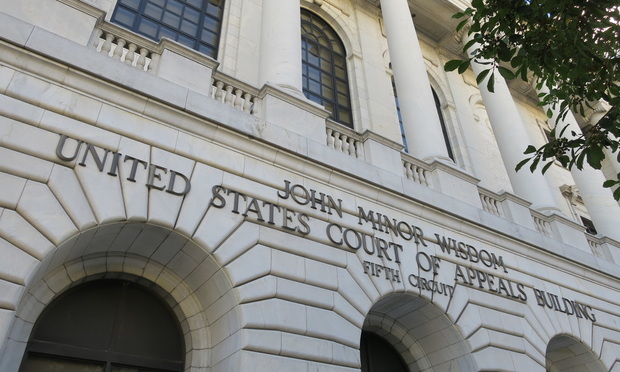Death Row Inmates Alleging Judge Was 'Impaired' at Trials Lose on Appeal
The U.S. Court of Appeals for the Fifth Circuit has turned down the appeals of two death row inmates who argued their convictions should be overturned because their trials were presided over by a disgraced former federal judge whom they allege was “impaired” during their proceedings.
September 17, 2018 at 03:13 PM
4 minute read
 U.S. Court of Appeals for the Fifth Circuit/photo by Michael A. Scarcella/ALM
U.S. Court of Appeals for the Fifth Circuit/photo by Michael A. Scarcella/ALM
The U.S. Court of Appeals for the Fifth Circuit has turned down the appeals of two death row inmates who argued their convictions should be overturned because their trials were presided over by a disgraced former federal judge whom they allege was “impaired” during their proceedings.
Walter Smith, who served as a U.S district judge in Waco for 32 years, was punished by the Fifth Circuit in 2015 after it concluded he made unwanted sexual advances against a female court employee in 1998. The employee also alleged that Smith had been drinking before some of his interactions with her, and that Smith's court clerk had to cancel his hearings because he had “been in the hospital” and was “not functioning.” Smith retired from the bench in 2016, which allowed him to avoid impeachment and keep his lifetime salary.
In 2000, Smith presided over the trials of Christopher Andre Vialva and Brandon Bernard, who were convicted of capital murder and sentenced to death for killing Todd and Stacie Bagley on federal property during a carjacking, sentences the Fifth Circuit affirmed on direct appeal in 2003.
Vialva and Bernard both filed subsequent habeas corpus petitions before a district court in 2017, arguing that Smith was unfit to conduct proceedings in their cases because of his “impairments.” The motions also alleged Smith committed numerous errors during their trial and subsequent habeas proceedings, and attached several other documents to their pleadings, including the Fifth Circuit's order in Smith's misconduct proceeding, an excerpt of the deposition from the court employee who alleged misconduct against Smith, and a 2017 article from Texas Lawyer detailing Smith's misconduct proceedings and his decision to retire.
A district court judge denied Vialva and Bernard's successive habeas corpus writs for lack of jurisdiction, noting their merit-based arguments had already been decided in the case, and that their alleged procedural defects were simply an attempt to circumvent the limits Congress placed on successive habeas petitions.
In its recent decision, the Fifth Circuit panel agreed with the district court, and denied Vialva and Bernard habeas corpus review for a second time.
“Although they purport to attack the integrity of their prior habeas proceedings, Bernard's and Vialva's invocation of defective procedure rests substantially on a merits-based challenge. To begin with, evidence from Judge Smith's misconduct investigation does not credibly implicate the procedural integrity of Bernard's and Vialva's prosecutions or subsequent habeas proceedings,” the Fifth Circuit wrote in a per curiam opinion.
“Evidence that Judge Smith engaged in unrelated misconduct in 1998 or that he neglected certain recusal requirements during the 2014 misconduct investigation does not raise an inference of defects in the habeas proceedings at issue here,” the court concluded. “The allegations offer no evidence—beyond gross speculation—that Judge Smith was, as Bernard and Vialva repeatedly assert, 'impaired' or 'unfit' to oversee their 2000 trial and subsequent habeas proceedings.”
Rob Owen, a Northwestern Pritzker School of Law professor who represents Bernard on appeal, said his client will likely appeal the Fifth Circuit's decision to the U.S. Supreme Court.
“The question we don't know is if [Smith] was incapacitated at the time he was presiding over our post-trial challenges — there's good reason to be concerned that he was,” Owen said. “But since the district court didn't give us the opportunity to develop that fact, the record is silent on that. That's where we are.”
Jared Tyler, a Houston attorney who represents Vialva on appeal, did not return a call for comment.
Joseph H. Gay Jr., a Western District of Texas assistant U.S. attorney who opposed Vialva and Bernard's subsequent habeas petitions, declined to comment.
This content has been archived. It is available through our partners, LexisNexis® and Bloomberg Law.
To view this content, please continue to their sites.
Not a Lexis Subscriber?
Subscribe Now
Not a Bloomberg Law Subscriber?
Subscribe Now
NOT FOR REPRINT
© 2025 ALM Global, LLC, All Rights Reserved. Request academic re-use from www.copyright.com. All other uses, submit a request to [email protected]. For more information visit Asset & Logo Licensing.
You Might Like
View All

Eversheds Sutherland Adds Hunton Andrews Energy Lawyer With Cross-Border Experience
3 minute read
Ex-Marathon General Counsel Takes Legal Reins of Another Energy Company

After Nearly 2 Decades in the Role, Longtime Haynes and Boone General Counsel Passes the Baton
3 minute readTrending Stories
- 111th Circuit Rejects Trump's Emergency Request as DOJ Prepares to Release Special Counsel's Final Report
- 2Supreme Court Takes Up Challenge to ACA Task Force
- 3'Tragedy of Unspeakable Proportions:' Could Edison, DWP, Face Lawsuits Over LA Wildfires?
- 4Meta Pulls Plug on DEI Programs
- 5On the Move and After Hours: Meyner and Landis; Cooper Levenson; Ogletree Deakins; Saiber
Who Got The Work
Michael G. Bongiorno, Andrew Scott Dulberg and Elizabeth E. Driscoll from Wilmer Cutler Pickering Hale and Dorr have stepped in to represent Symbotic Inc., an A.I.-enabled technology platform that focuses on increasing supply chain efficiency, and other defendants in a pending shareholder derivative lawsuit. The case, filed Oct. 2 in Massachusetts District Court by the Brown Law Firm on behalf of Stephen Austen, accuses certain officers and directors of misleading investors in regard to Symbotic's potential for margin growth by failing to disclose that the company was not equipped to timely deploy its systems or manage expenses through project delays. The case, assigned to U.S. District Judge Nathaniel M. Gorton, is 1:24-cv-12522, Austen v. Cohen et al.
Who Got The Work
Edmund Polubinski and Marie Killmond of Davis Polk & Wardwell have entered appearances for data platform software development company MongoDB and other defendants in a pending shareholder derivative lawsuit. The action, filed Oct. 7 in New York Southern District Court by the Brown Law Firm, accuses the company's directors and/or officers of falsely expressing confidence in the company’s restructuring of its sales incentive plan and downplaying the severity of decreases in its upfront commitments. The case is 1:24-cv-07594, Roy v. Ittycheria et al.
Who Got The Work
Amy O. Bruchs and Kurt F. Ellison of Michael Best & Friedrich have entered appearances for Epic Systems Corp. in a pending employment discrimination lawsuit. The suit was filed Sept. 7 in Wisconsin Western District Court by Levine Eisberner LLC and Siri & Glimstad on behalf of a project manager who claims that he was wrongfully terminated after applying for a religious exemption to the defendant's COVID-19 vaccine mandate. The case, assigned to U.S. Magistrate Judge Anita Marie Boor, is 3:24-cv-00630, Secker, Nathan v. Epic Systems Corporation.
Who Got The Work
David X. Sullivan, Thomas J. Finn and Gregory A. Hall from McCarter & English have entered appearances for Sunrun Installation Services in a pending civil rights lawsuit. The complaint was filed Sept. 4 in Connecticut District Court by attorney Robert M. Berke on behalf of former employee George Edward Steins, who was arrested and charged with employing an unregistered home improvement salesperson. The complaint alleges that had Sunrun informed the Connecticut Department of Consumer Protection that the plaintiff's employment had ended in 2017 and that he no longer held Sunrun's home improvement contractor license, he would not have been hit with charges, which were dismissed in May 2024. The case, assigned to U.S. District Judge Jeffrey A. Meyer, is 3:24-cv-01423, Steins v. Sunrun, Inc. et al.
Who Got The Work
Greenberg Traurig shareholder Joshua L. Raskin has entered an appearance for boohoo.com UK Ltd. in a pending patent infringement lawsuit. The suit, filed Sept. 3 in Texas Eastern District Court by Rozier Hardt McDonough on behalf of Alto Dynamics, asserts five patents related to an online shopping platform. The case, assigned to U.S. District Judge Rodney Gilstrap, is 2:24-cv-00719, Alto Dynamics, LLC v. boohoo.com UK Limited.
Featured Firms
Law Offices of Gary Martin Hays & Associates, P.C.
(470) 294-1674
Law Offices of Mark E. Salomone
(857) 444-6468
Smith & Hassler
(713) 739-1250






